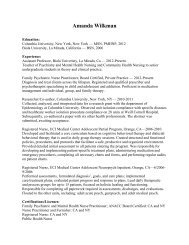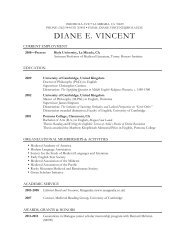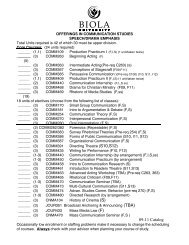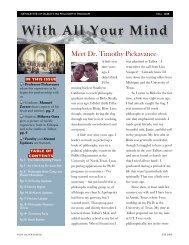New President, New Century New President, New ... - Biola University
New President, New Century New President, New ... - Biola University
New President, New Century New President, New ... - Biola University
Create successful ePaper yourself
Turn your PDF publications into a flip-book with our unique Google optimized e-Paper software.
What does current research<br />
into body image reveal?<br />
The more refined research is showing the impact<br />
of women’s perceived body image — their ideas of<br />
what other people think of them — rather than<br />
what other people really think of them. There’s a<br />
subtle difference there, like, for instance, with a<br />
husband and wife. The husband will say, “I think<br />
you’re fine,” but if the woman’s perception is<br />
that he really doesn’t mean that, then that takes a<br />
toll on her. He can be saying until he’s blue in the<br />
face, “I don’t have any trouble with how you’re<br />
shaped and what you look like,” but her<br />
perception is what is the most powerful.<br />
What steps should be taken<br />
if someone suffers from an<br />
unhealthy body image?<br />
With clinical eating disorders, interventions will<br />
vary woman to woman. I’ve worked with clients<br />
who I’ve told not to read fashion magazines. That<br />
may seem like a small thing, but it’s not small for<br />
somebody who is already distressed about her<br />
body because fashion magazines depress every<br />
woman. Many of my patients have spent a lot of<br />
money on them, and they also often surround<br />
themselves with people who reinforce the message<br />
that they’re overweight. These are the girls<br />
with boyfriends who tell them, “You need to lose<br />
some weight.” So, women can choose to be in<br />
relationships with men who don’t talk that way to<br />
them. And Christian women can learn to see<br />
themselves as God sees them. That can be a wonderful<br />
healing thing, knowing “I’m one of God’s<br />
creatures. He created me. I’m beautiful to Him.”<br />
How can families help young<br />
girls develop a healthy body image?<br />
I have a 6-year-old daughter who loves to put on<br />
outfits and match them. I’ll say, “Oh, you look<br />
beautiful. What a smart girl you are to be able to<br />
be so creative with your clothes.” So, I’m always<br />
throwing in what a smart girl she is with how<br />
beautiful she looks. However, you don’t want to<br />
go too far the other direction and deny telling<br />
girls they’re beautiful. Families must also realize<br />
that moms set the tone a lot of the times. If mom<br />
is continually obsessing about her weight and<br />
continually dieting — always saying, “Oh my<br />
goodness, how many calories are in that?” — that<br />
sends a very strong message to young girls as to<br />
what they should be concerned about and what’s<br />
most important in the world.<br />
Tamara Anderson<br />
has been in clinical practice for 16<br />
years. Her areas of specialization<br />
include eating disorders, and she<br />
directed an eating disorder unit at an<br />
in-patient hospital.<br />
Why Are We Drawn<br />
to the Lives of the Famous?<br />
Anna Nicole Smith’s child custody<br />
battle. Paris Hilton’s trip to prison.<br />
Brad and Angelina’s breakups.<br />
Americans are obsessed with celebrities.<br />
Psychologist John Townsend (M.A. ’82, Ph.D.<br />
’84) examines the internal emptiness that<br />
compels us to follow celebrities’ lives so closely.<br />
We’re a celebrity-based culture.<br />
We have access to celebrities with the<br />
paparazzi and with cell phones and with the<br />
Web that we’ve never had before. They have no<br />
privacy. I feel sorry for celebrities because they<br />
have to go to extreme measures to have any<br />
kind of a life.<br />
This fascination isn’t new.<br />
It’s been around for a long time — a lot longer<br />
than paparazzi have been around. We’ve always<br />
been really drawn to the celebrity. In fact, being<br />
famous in the Bible sometimes has been a sign of<br />
God’s blessing to others: “I have been with you<br />
wherever you have gone, and I have destroyed<br />
all your enemies before your eyes. Now I will<br />
make your name as famous as anyone who has<br />
ever lived on the earth (I Chronicles 17:8).”<br />
It’s not all bad.<br />
There’s something about learning about other<br />
people’s lives that can enrich us and can give us<br />
lessons to learn about mistakes we don’t want<br />
to make or about people who inspire us to be<br />
better. As long as our interest helps us be better,<br />
more mature, more wise in some way, there are<br />
things to be gained.<br />
But have you ever had<br />
“celebrity withdrawal”?<br />
When you find that there is kind of an attraction<br />
to the latest — and you don’t feel like you’ve<br />
really had your morning coffee until you’ve<br />
found out about the latest celebrity’s blunder or<br />
tragedy or whatever is happening — a lot of<br />
times what that speaks to is that you don’t have<br />
the life inside of you that you would like to have.<br />
It’s a pain killer.<br />
There’s kind of a vacuum or a deficit inside<br />
some of us, like maybe our relationships aren’t<br />
the ones we want — they’re not moving the way<br />
we want them to — so we use celebrity<br />
addiction as an anesthetic to not feel and<br />
experience what’s going on in our lives and,<br />
instead, look out at their lives.<br />
They look so perfect.<br />
Other times, we develop celebrity addiction<br />
because they look ideal to us, like they never have<br />
any problems. We can have OK lives, but, if we<br />
have a real perfectionist tendency, then we think,<br />
“I could be so much better if I was like them.”<br />
Be your own reality show.<br />
The more you find that reality works for you —<br />
that you can face your problems and solve them<br />
and that you can reach your goals, not perfectly<br />
but you can see movement every day — the less<br />
draw and addiction there is to celebrities<br />
because the vacuum inside has been taken out.<br />
Trading places.<br />
If you’ve got people who love you, a spiritual life<br />
that makes sense and work activities that are<br />
fulfilling, you’ll find you’ll look at celebrity news<br />
as entertaining, but you won’t need it because<br />
you have what it is that celebrities want — a<br />
good life, structure and meaning. That makes you<br />
the celebrity because you don’t need to look outside<br />
your life and relationships anymore. It’s<br />
what Paul refers to in his teaching about contentment:<br />
“For I have learned how to be content with<br />
whatever I have (Philippians 4:11).”<br />
John Townsend (M.A. ’82, Ph.D., ’84)<br />
is a clinical psychologist and marriage<br />
and family therapist with an international<br />
speaking ministry and a nationally<br />
syndicated radio program, <strong>New</strong> Life<br />
Live, which he co-hosts with psychologist<br />
Henry Cloud (M.A. ’81, Ph.D. ’87).<br />
Townsend has authored or co-authored 18 books,<br />
including the most recent, Boundaries With Teens,<br />
part of the bestselling Boundaries series.<br />
FALL ’07 27<br />
Richard B. Levine / Levine Roberts Photography

















